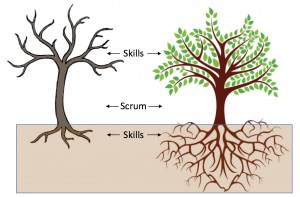Achieving Excellence in Agile
Inspiring Teamwork, Accomplishing Deadlines, and Removing Frustrations
A One-day Hands-on Training Workshop to Master Your Agile/Scrum Implementation
Contact us for a custom session for your group

Summary
- Grow your Agile/Scrum teams to perform at their best.
- Identify your Agile/Scrum strengths, diagnose the challenges, set improvement priorities, and develop an improvement plan going forward.
- Improve your team’s ability to enjoy project work while meeting deadlines and avoid the support black hole of endless bugs.
Scrum is a software development methodology based on Agile principles. Agile methodologies promote a project management process that encourages frequent inspection and adaptation, a leadership philosophy using teamwork, self-organization and accountability, with strong customer involvement.
Agile/Scrum is a framework, and without close attention to the practices used, Agile/Scrum implementations can quickly lead to quality problems, chaos, and missed budgets and deadlines. When an Agile/Scrum implementation has problems, no one is having fun.
How are the skills in your team?
This seminar is about maximizing the benefits of your Agile/Scrum implementation while addressing the problems and frustrations encountered so far. If you are new to Agile/Scrum, this session will tell you what to look out for.
Audience
- Scrum Masters, Product Owners and team members who want to further develop their Agile practices and team results.
- Senior managers aspiring to improve their group’s efficiency and quality while maintaining the benefits of Agile/Scrum.
Topics Covered
Introduction
- Quick summary of Agile/Scrum
- Framework vs. complete solution?
- Exercise: What is working and what is not in your organization?
Backlog, user stories, details, and grooming
- A great backlog vs. a mumbo-jumbo backlog
- Ambiguous one-line user stories
- Calling everything a user story (requirement, task, bug, to-do)
- Overcoming accountability and visibility caused by requirements
- Eliciting requirements — questions to ask
- User stories vs. Use cases — when and where to use & keeping requirements light-weight
- Adding and organizing details
- Dealing with existing specs
- Exercise: Three actions to take back
Release and sprint planning
- Should you have a release plan?
- Relationship between release plans, running the business, and money
- How to make velocity numbers work
- Factoring in sprint capacity
- Exercise: What is your sprint capacity?
- Identifying surprises and preparing for surprises
- Exercise: Doing risk management
- Managing dependencies across teams
- Dealing with fixed-price contracts (as a vendor & with suppliers)
- Exercise: Three actions to take back
Sprint execution, order, and engineering activities
- Speed can be mistaken for progress (many components developed that don’t work together)
- Architecture/design — do you need some? Emergent design, some design, no design, and design flaws
- Time for testing: factoring in system test and end-to-end scenario testing
- Exercise: Changing the focus of your sprints
- Configuration management: what version of __ are you working on?
- ScrumBut: What steps are really being done — how to raise and maintain the bar?
- Exercise: Three actions to take back
Tracking project progress
- Ignoring burn down data because it is too painful
- Why is management so upset and why do they micromanage the team?
- Addressing symptoms and not causes
- No thresholds set on when to replan. How bad is bad? Can you really catch up?
Your next step — getting focused
- Exercise: Your action plan to take back — a problem to fix or goal to achieve?
- Exercise: What message to take back?
Additional follow-on topics available — contact us
- Comparison to CMMI and PMBOK – implementing Scrum, CMMI and PMBOK or any combination
- Leadership practices to lead agile teams
- Scaling scrum for large / complex projects
“The Process Group’s Agile/Scrum class provided useful guidance on how to combine Agile/Scrum methodologies with software engineering lifecycle processes, creating a powerful combination of adaptability and predictability for software development.”
Margaret Bailey, Engineering Process Group Lead, Sonalysts, Inc., Waterford, CT.
“Working with Neil on Scrum and Agile implementation removed a lot of the initial frustration our teams felt about incorporating the processes. Understanding the added benefits and seeing measurable improvements brought everyone on board.”
Mark Schulte, Software Branch Manager, KIHOMAC, Dallas TX.
Request a custom event
Generate an email to your colleague! [Subject: Here’s a great session on improving our Agile implementation] Quick Link
Questions?
- Contact Neil Potter, cell/text: 972 418 9541, email: neil at processgroup dot com
About the Instructor
Neil Potter is co-founder of The Process Group, a company formed in 1990 that consults on leadership challenges, software engineering, process improvement, Agile/Scrum, CMMI, and project management. He has 28 years of experience in software and process engineering. Neil is a Certified Scrum Master, CMMI-Institute-certified lead appraiser for SCAMPI appraisals, Intro to CMMI instructor (development and services), and Six Sigma Greenbelt. He has a B.Sc. in Computer Science from the University of Essex (UK) and is the co-author of Making Process Improvement Work – A Concise Action Guide for Software Managers and Practitioners, Addison-Wesley (2002), and Making Process Improvement Work for Service Organizations, Addison-Wesley (2012).

 The Process Group helps you improve your organization's capability to routinely meet deadlines and delivery quality expectations. We are certified CMMI appraisers / trainers and Certified Scrum Masters.
The Process Group helps you improve your organization's capability to routinely meet deadlines and delivery quality expectations. We are certified CMMI appraisers / trainers and Certified Scrum Masters. 